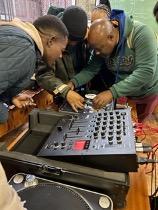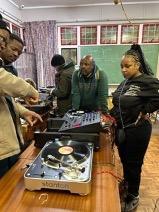Lee Watkins - International Library of African Music-Rhodes University, South Africa
Markus Coester - Anthropology; Bayreuth University, Germany
Tom Mboya - Moi University. Eldoret, Kenya
Jane Mwonga - Moi University. Eldoret, Kenya
Tabitha Osoro - Moi University. Eldoret, Kenya
Nicole Pooley – ILAM, RU, South Africa
Madiba, Elijah - ILAM-Rhodes University, South Africa
Albert Oikelome – UNILAG, Nigeria
The project researches the “digital return,” a relatively new form and practice of repatriation/restitution of submerged but now digitally re-accessible musical and cultural material (Lobely 2012, Bell et al. 2013, Mojako 2016, Gimenez 2018, Madiba 2019), and, as intimated by digital return efforts/research so far, the significance of its relatedness to processes of heritage and identity production as well as the decolonization of institutional music archives/repositories in three African countries: South Africa, Kenya, and Ghana.
The main objective of the project is to enhance our understanding of how repatriation/restitution in the field of music and centred in Africa and on African archives is related to and has multiple effects on new forms of cultural production associated with “heritage” and more precisely intangible cultural heritage, identity/ethnicity re/construction/affirmation, and current trends of decolonization and ‘freeing’/opening up of music archives, collections, and digital repositories (were digitization has been done), which for decades were shaped by notions of colonial and corporate authority and ownership. The project will thus also contribute to currently increasing debates on restitution and related ‘rights issues’, like ownership, copyright, and intellectual property rights.
Investigating the “digital return” and the interrelated cultural processes it has triggered (and will more in the future provided more digitisation is achieved) and their effects in recent years, centres on four ‘agents’/archives in this project: ILAM, South Africa, the GBC Gramophone Library, Ghana, and Equator Heritage Sound and Ketebul Music, Kenya. These ‘institutional agents” have been very active in the last decade in digitisation, return and ‘playing back’ respectively, valuable and significant parts of the musical and cultural past/heritage in their respective countries, to individual communities, ethnic groups, as well as their societies. Their contribution to and entanglement in ‘digital return’ is thus a promising vantage point for this research.
Opening up these archives through repatriation/digital return is a decolonising and thus inevitably contested act which still also struggles with colonial and neo-colonial regimes of ownership and control to be investigated in this project while repatriation has had an impact in these countries on cultural and heritage re/production to be captured and studied in this project.
We argue that the digital return is not enough. Attempts hitherto at digital return of music have been numerous, and undertaken in many parts of the globe. Even though the practice is widespread there is comparatively little known about how this process unfolds and how it should be articulated within the public domain. Further, attempts so far focused on the return of ‘the item’, in a romanticized way, as most of the research on digital return has focused on the act of giving back; less attention has been paid to how these materials are circulated and accessed once they are home; that is, what happens once digital materials are returned (Bell, Christen and Turin 2013)?
A critical aspect of testing the above ideas and goals is through partnerships with community-based arts organisations. One such organisation is Egazini, based in Joza township of Grahamstown. We provided them all of Hugh Tracey’s recordings of the amaXhosa in this area. These recordings have been returned to local artists who will have present their work at a concert on 24 June 2023. In the meantime, the pictures below were taken at some of the workshops held up to now, where artists were introduced to turntables and bringing ideas together for the concert.
https://www.africamultiple.uni-bayreuth.de/en/2-Research/Research-Projects/Arts-and-Aesthetics/Beyond-the-digital/index.html


Last Modified: Tue, 04 Jun 2024 13:27:09 SAST


